Meta PH and Connected Women Champion Digital Inclusion in Latest Women-Led Forum
 Contributed by
Sasha Lim Uy Mariposa
April 25, 2022
Contributed by
Sasha Lim Uy Mariposa
April 25, 2022
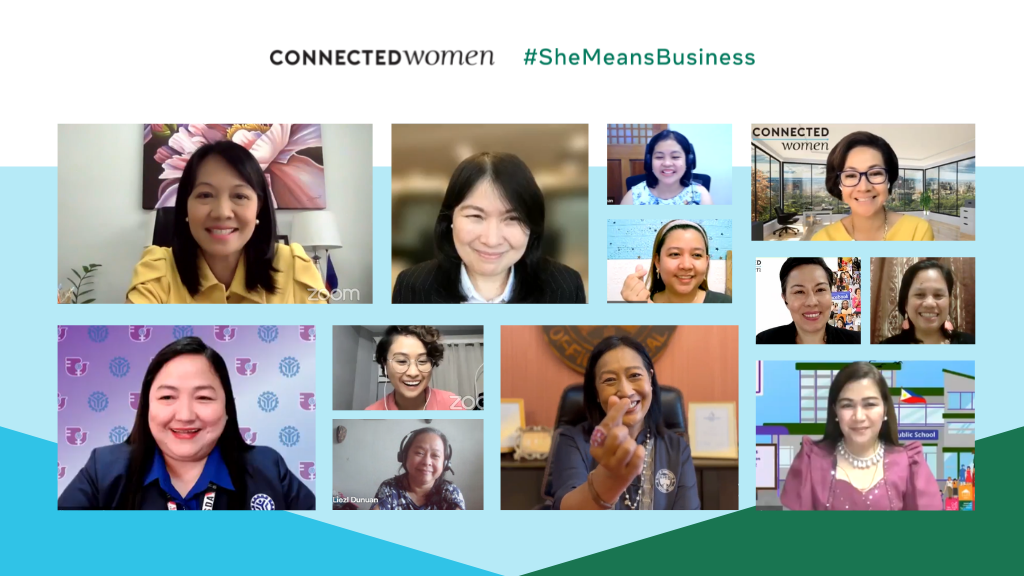
If one could put a theme for what Filipino women have gone through in the last two and a half years, it would be resilience. After all, it takes a certain kind of strength and flexibility to withstand the changes and demands asked of Filipino women by the pandemic-caused economic and social upheaval.
How far women lagged in the digital economy during the pandemic has been well-documented. Apart from tech jobs being stereotypically male-dominated, there are also issues of inaccessibility and a lack of technological literacy. However, determined organizations, such as social impact startup Connected Women, TESDA, and the Department of Trade and Industry, among many others continue to campaign for more opportunities for Filipina women. In fact, Connected Women and Meta PH’s SheMeansBusiness, a resource hub dedicated to assisting entrepreneurial women, recently celebrated a six-year-old partnership at an event last March 30.
These concerted efforts have yielded terrific results. Program keynote speaker Rafaelita Aldaba said that the Philippines ranked 17th out of 156 countries that have narrowed the digital gender divide. Aldaba, who is the DTI Undersecretary for Innovation and Competitiveness, said:
“The Philippines has closed 80% of the economic participation and opportunity gender gap, with women outnumbering men in senior and leadership roles as well as in professional and technical professions.” However, she added that Filipinas are still behind in terms of advanced access, such as skills, entrepreneurship opportunities, and leadership positions.
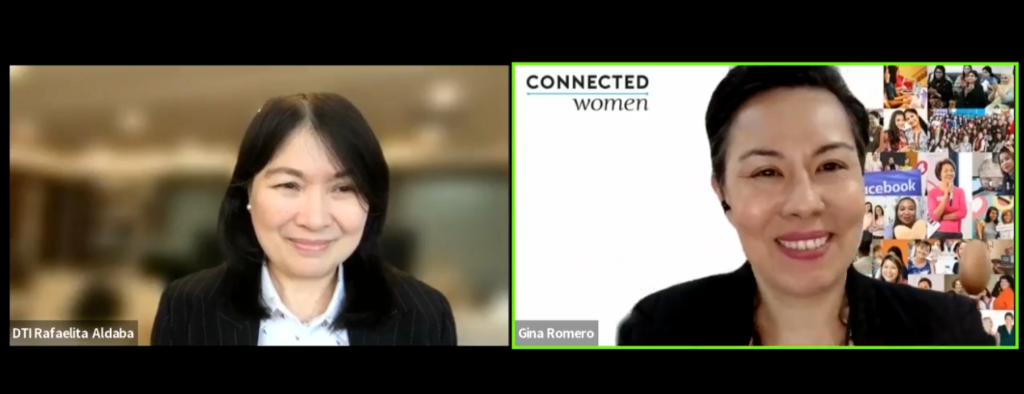
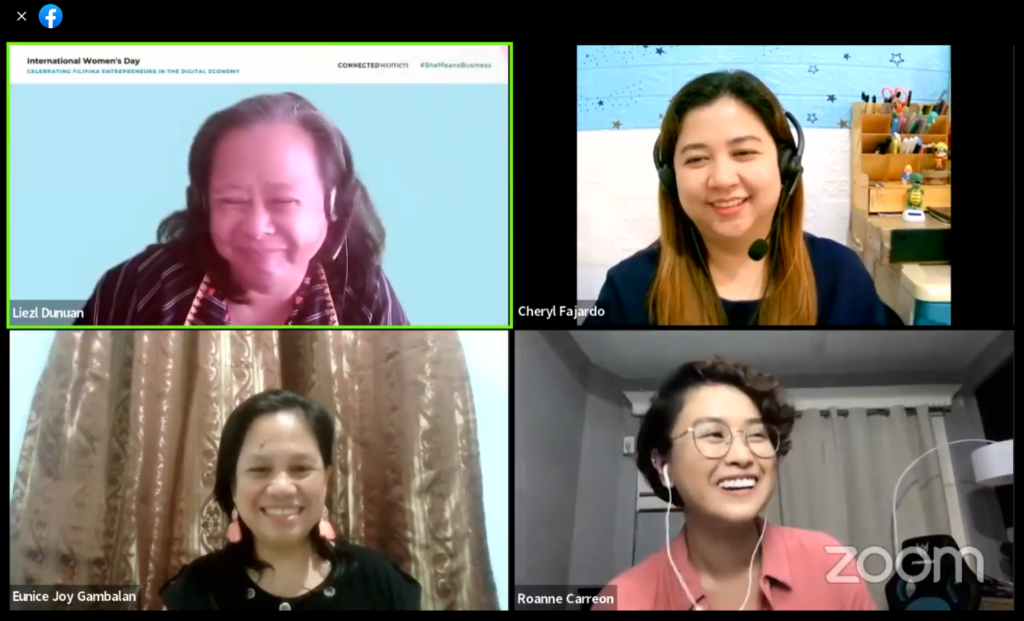
A Digital Pivot
Aldaba believes that the divide begins from an earlier level. Young women feel more inclined to join non-science disciplines like law or social science. “Even in ASEAN countries where data on STEM graduates show a high proportion of females, there appears to be a drop off after graduation. They don’t continue into related employment,” she explained.
But the prospects do not end there. Tech doesn’t discriminate based on gender or age. With the many limitations of the pandemic, women became resourceful, figuring out personal ways to enter the digital economy.
Cheryl Fajardo, a mother of three and trained physical therapist, admitted that things were already challenging even before the digital economy. Oftentimes, women must choose between family and career. “When you don’t work for two years, it’s hard to go back and apply to a traditional working environment,” she added.
The pandemic turned out to be a blessing for her professionally. She learned about online data annotation. She took courses and she was part of the third Elevate AIDA batch, Connected Women’s program for training women in artificial intelligence data annotation. Currently, she is a data-labeling project implementation lead for the organization.
Some opportunities are less conspicuous. In 2019, Roanne Carreon and her partner began Facebook and YouTube accounts to increase LGBTQIA++ awareness. However, when the lockdowns revealed that not all domestic arrangements were safe, they set out to create an encouraging digital venue for members of the LGBTQIA++. Queer Safe Spaces became a haven for people to become their authentic selves.
In the beginning, members with a psychology background would offer advice to help support those undergoing mental health issues regarding their gender identity. However, the Meta Accelerator Program helped the 15,000-strong Queer Safe Spaces become recognized as a non-profit organization. Currently, it offers subsidized mental health services as well as business training for queer-run SMEs.
“I realized that every woman from every sector and industry has something to learn from their fellow women. And, therefore, every woman always has something to contribute,” Carreon said.
“Also, as a woman from one of the most marginalized groups—the LGBTQ+—I feel more visible, included, and empowered. Thank you for this opportunity, and I look forward to more events such as this that celebrate and highlight the diversified roles of women as an integral part of social progress.”
For entrepreneur Eunice Joy Gambalan, the path wasn’t as clear-cut. She grew House of J, a digital fashion and styling business during the pandemic. What began as a store for custom clothing became a diverse enterprise when she started accumulating trinkets, souvenirs, and more items from other sellers who were knocked down by the pandemic. She bridged the gap between local artisans and consumers.
Gambalan’s advice? “Pursue your passion. Embrace your purpose. Pray for direction.” When she began House of J, she raised eyebrows because “fashion, fashion lang yan. It’s not a necessity.” At the peak of COVID-19, the fashion industry grew by 20%.
“If I may add, allow me to thank Connected Women and Meta PH for investing in the hands that rock the cradle. Through their combined efforts, these hands get an opportunity to truly become the hands that rule the world,” Gambalan shared. “An empowered woman can better nurture the leaders of tomorrow, male or female.”
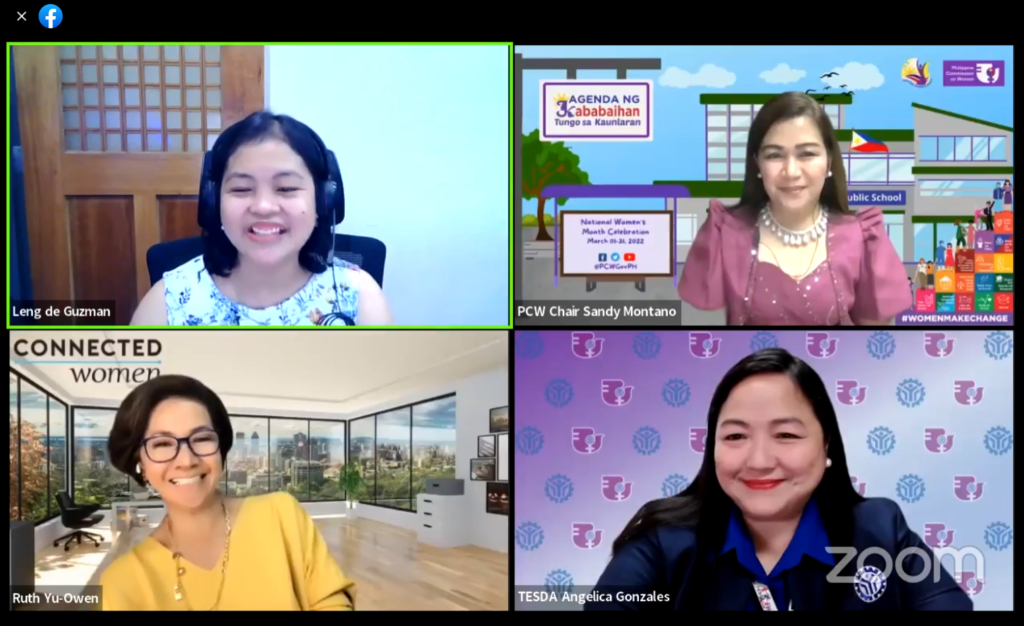
Tools for Women
“Huwag tayong matakot. Napapag-aralan. Maraming mga ahensya ang gobyerno, mga NGOs na maari kayong tulungan at maaari kayong i-guide. All you have to do is be open-minded,” reminded Sandra Montano, Philippine Commission on Women Chair.
TESDA, for example, has several initiatives, including the TESDA Online Program (TOP), which offers free online courses, which include ICT and agenda and development modules. The TESDA Flexible Learning Delivery Mode offers face-to-face, online, blended, and distance learning, ideal for stay-at-home mothers who aren’t often in charge of their schedules.
According to Angie Gonzales, TESDA Women Center Chief, the TESDA Women Center has become a resource for training online instructors and hosts the Connected Women’s Elevate AIDA project. In March 2022, the agency and Coca-Cola Philippines also launched the iStar Program, an upgraded, digital version of the Sari-Sari Store Training and Access Resources (STAR) Program, which provides entrepreneurial skills training for Filipino women.
“TESDA’s commitment and initiatives to increase women’s participation in Non-Traditional sectors and promote gender equality and social inclusion in Technical Vocational Education and Training (TVET) have been consistently strengthened over the years,” said Gonzales. “As we continue to celebrate women empowerment, we all agree that our work is far from finished. Now that we are transitioning to the ‘new and now normal’, TESDA, through the TESDA Women’s Center will continue to support Connected Women and META PH to promote digital literacy, advocate, and train women in ICT-related programs. Let us all keep on working towards a better future for women and girls.”
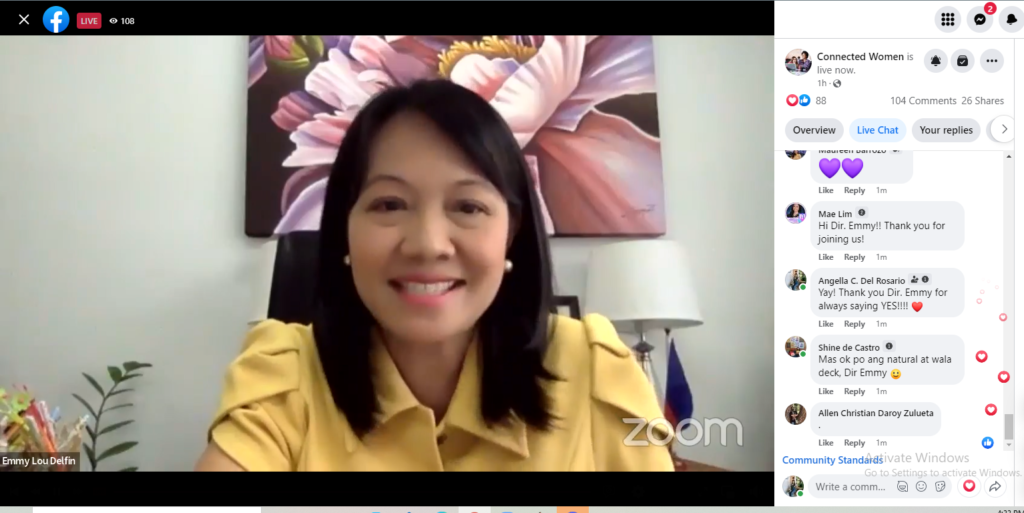
The Department of Information and Communications Technology has also been actively promoting women’s roles in the digital economy. It has a stream of workshops for digital literacy and training. Recently, it held a webinar entitled “Women and Innovation, a Way Forward for Women’s Economic Empowerment,” which featured home-based Filipino mothers who manage to run households and attend freelance digital professions.
“Women have been an integral part of emerging technologies as these continuously evolve as mature economies,” says DICT Director Emmy Lou Delfin, adding that women helped develop cryptocurrencies and the blockchain and are pioneers in transportation and cybersecurity, among others.
“Looking back, all of these seemed impossible. But what we know now is that men’s success in venturing and developing profitable initiatives in the digital economy only proves that women are just as capable as men in industries known to be dominated by men,” Delfin encouraged.
Upskilling and learning about digital computing technologies is no longer a nice to have. It’s become a crucial component in the internet economy not only financially, but also socially.
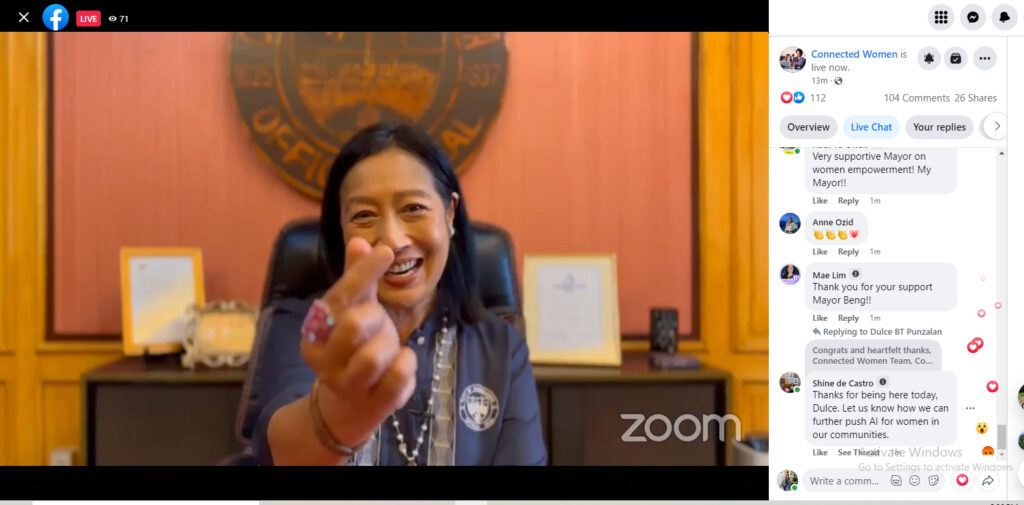
Zamboanga Mayor Beng Climaco believes the city’s digital inclusive initiatives, which include Connected Women’s Elevate AIDA, have been instrumental in giving Zamboanga women renewed hope, “a digital lifeline to navigate the new normal.” In 2020, Zamboanga was named in DICT’s list of 25 Digital Cities 2025. Under Climaco, it has created the groundwork to become a digital hub, developing avenues for information technology, business process management, and digital inclusion.
“Digital literacy is the first step towards unlocking the potential of women to be digitally enabled and digitally empowered,” she added. “I believe women should be at the forefront of the resiliency agenda because after all, it is women who serve as the core of resilience at home and the community.”
Resilience. That’s only one of the words to describe women in the last two years. There’s also grit, determination, and resourcefulness. All these, coupled with digital empowerment, will define the future for Filipino women everywhere.










Sorry, the comment form is closed at this time.